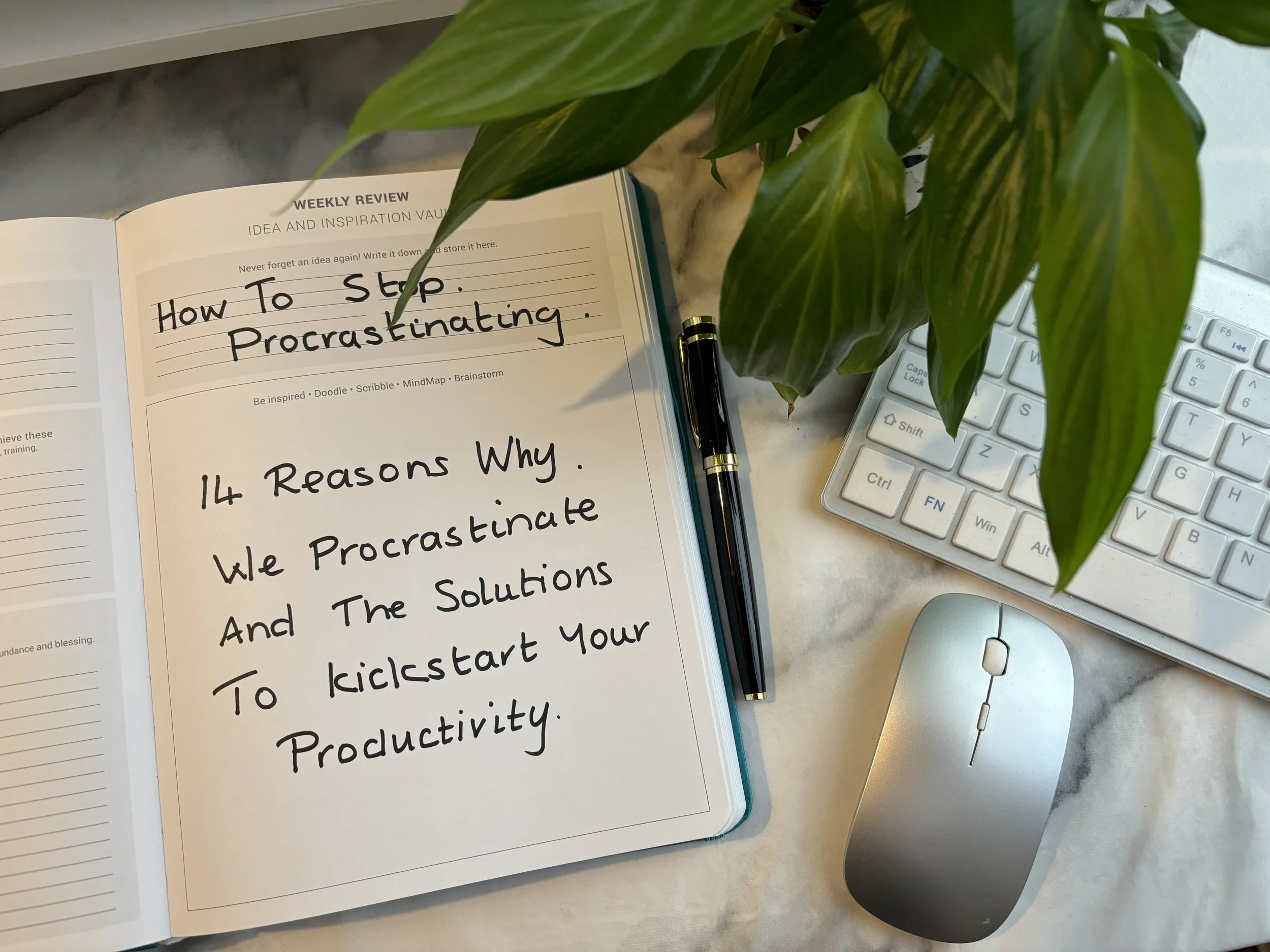If you've been procrastinating recently, don't beat yourself up – we all fall prey to procrastination and that's perfectly okay. There's always a reason behind our procrastination tendencies, fear, perfectionism, or simply feeling overwhelmed.
The first step to overcoming procrastination is acknowledging and accepting it without judgment or shame.
Once we accept that procrastination is a natural part of the human experience, we can approach it with compassion and curiosity. We are not robots, we have feelings and there will be things we are good at and not so good at. There will be things we like and don’t.
By understanding why we procrastinate, we can begin to unravel the underlying factors driving our behaviour and identify actionable solutions.
Remember, there's always a solution waiting to be discovered – we just need to be patient and persistent in our quest to overcome procrastination.
In this article, we'll explore 14 common reasons why we procrastinate and provide practical solutions to help you break free from this productivity trap.
PARALYSED BY FEAR: Fear of failure or judgment can paralyse us, making it difficult to take action. To overcome this, try reframing failure as an opportunity for growth and learning.
SOLUTION: Break tasks down into smaller, manageable steps and focus on progress rather than perfection.
EXCESSIVE PERFECTIONISM: Perfectionism can lead to analysis paralysis, preventing us from getting started on tasks.
SOLUTION: Practice setting realistic goals and deadlines, and remind yourself that it's okay to make mistakes. Embrace the concept of "good enough" and prioritize completion over perfection.
LACK OF KNOWLEDGE OR UNDERSTANDING: Sometimes, we procrastinate because we feel overwhelmed by a lack of knowledge or understanding.
SOLUTION: Take the time to educate yourself and break tasks down into smaller, more manageable chunks. Seek out resources and support to help you gain the skills and knowledge you need.
PESSIMISM ABOUT THE OUTCOME: Negative thinking can hinder our motivation and productivity. Challenge pessimistic thoughts by focusing on past successes and positive outcomes.
SOLUTION: Visualise achieving your goals and remind yourself of the benefits of taking action. Imagine what it will fell like to finish.
PERCEIVED DIFFICULTY OF THE PROJECT: When a project seems too challenging, it's easy to put it off. Break the task down into smaller, more manageable steps and tackle them one at a time.
SOLUTION: Celebrate your progress along the way and focus on building momentum.
BOREDOM: Tasks that seem uninteresting can be difficult to tackle.
SOLUTION:
Find ways to make the task more engaging, such as listening to music or podcasts while you work.
Remind yourself of the importance of completing the task and the satisfaction you'll feel once it's done.
The other solution is to delegate or outsource. Someone else may really enjoy doing this. And remember time is money, it may be way cheaper and way less painful to pay someone else to do it. The cost of delay or not doing it all will be way higher.
LACK OF ENERGY OR MOTIVATION: Low energy levels can sap our motivation and make it hard to get started on tasks.
SOLUTION: Take care of your physical and mental well-being by prioritizing sleep, exercise, and nutrition. Break tasks down into smaller, more manageable chunks and tackle them during times when you feel most energetic.
LACK OF CLEARLY DEFINED GOALS: Without clear goals, it's easy to procrastinate.
SOLUTION: Take the time to clarify your goals and break them down into actionable steps.
Write them down and revisit them regularly to stay focused and motivated. Focus on the end goal.
NEED FOR INSTANT GRATIFICATION: The attraction of more interesting tasks can derail our productivity. SOLUTION: Practice delayed gratification by rewarding yourself after completing tasks, rather than seeking out distractions in the moment. SolutionSet boundaries around time-wasting activities and use tools like time-blocking to stay focused.
TIME MANAGEMENT PROBLEMS: Poor time management can lead to procrastination.
SOLUTION: Use techniques like time-blocking or The Pomodoro Technique. Prioritise tasks and allocate time effectively. Identify and eliminate time-wasting activities to free up more time for important tasks.
UNCLEAR HOW TO GET STARTED: Sometimes, we procrastinate simply because we're not sure exactly where to begin.
SOLUTION: Break tasks down into smaller, more manageable steps and create a clear action plan. Start with the easiest or most enjoyable task to build momentum and confidence.
FEELING OVERWHELMED: Feeling overwhelmed can lead to procrastination and inaction. we are left feeling like we are running around in circles.
SOLUTION: Break tasks down into smaller, more manageable chunks and focus on one thing at a time. Practice self-care and stress-management techniques to reduce overwhelm and increase focus. Feeling overwhelmed can most times be fixed with prioritization.
DISTRACTED BY EVERYTHING ELSE: In today's digital world, distractions are everywhere.
SOLUTION: Minimise distractions by creating a dedicated workspace, turning off notifications, and using productivity tools like website blockers. Practice mindfulness and focus on the present moment to increase concentration.
UNDERLYING CONDITIONS: Procrastination can be a symptom of underlying conditions such as depression, anxiety or ADHD.
SOLUTION: Seek support from a mental health professional if you're struggling with persistent feelings of procrastination or if it's significantly impacting your daily life.
Overcoming procrastination is possible with awareness, effort, and the right strategies. Remember you are not alone and most of us procrastinate for any of the above reasons.
First, be kind to yourself. By identifying the root causes of procrastination and implementing practical solutions, you can increase your productivity, achieve your goals, and reclaim control over your time and life. Remember, small changes can lead to big results.

